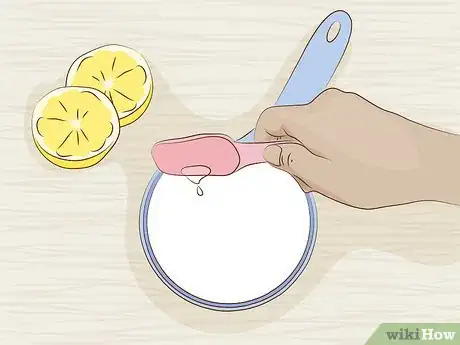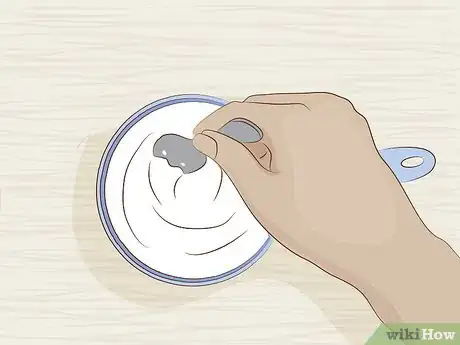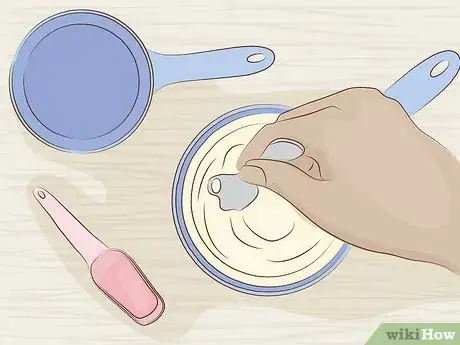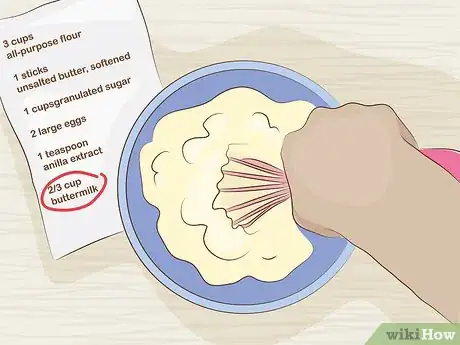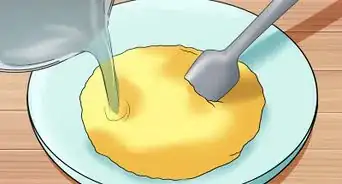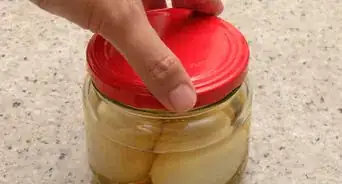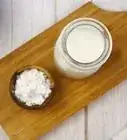This article was co-authored by wikiHow Staff. Our trained team of editors and researchers validate articles for accuracy and comprehensiveness. wikiHow's Content Management Team carefully monitors the work from our editorial staff to ensure that each article is backed by trusted research and meets our high quality standards.
This article has been viewed 134,601 times.
Learn more...
When you open the fridge and find sour milk, it's usually bad news. But the truth is that sour milk can actually be a handy ingredient in a variety of baked goods and savory dishes. You don't want to use milk that's actually spoiled, though, so knowing how to sour milk yourself can definitely come in handy. By mixing a little bit of acid into your regular milk, you can help thicken and curdle it so it has a tangy taste. You can even do the same with a can of sweetened condensed milk, though you need a little water to thin it out.
Ingredients
- 1 scant cup (237 ml) whole milk
- 1 tablespoon (15 ml) lemon juice or vinegar
- ½ cup (103 g) sweetened condensed milk
- ½ cup (118 ml) cold water
- 1 tablespoon (15 ml) vinegar or lemon juice
Steps
Whipping Up Regular Sour Milk with Whole Milk
-
1Pour the acid into the milk. Fill a measuring cup with 1 cup (237 ml) of whole milk minus 1 to 2 tablespoons (15 to 30 ml). Next, add 1 tablespoon (15 ml) of fresh lemon juice or white vinegar to the milk.[1]
- You can substitute 2% milk or heavy cream for the whole milk if you prefer.
-
2Stir the acid and milk together well. After you’ve added the lemon juice or vinegar to the milk, use a spoon to mix the two together. Be sure to blend them well so the acid is fully incorporated into the milk.[2]Advertisement
-
3Let the milk mixture sit for at least 5 minutes. Once the milk and acid have been mixed together completely, allow the mixture to stand at room temperature for 5 to 10 minutes. That will give it time to thicken up and curdle slightly so you’ll have sour milk.[3]
- The recipe makes 1 cup (237 cup) of sour milk. However, you can easily halve, double, or triple it based on your needs.
Making Sour Milk with Sweetened Condensed Milk
-
1Measure the sweetened condensed milk. For the sour milk, you’ll need ½ cup (103 g) of sweetened condensed milk. Carefully pour it into a measuring cup to ensure that you get the right amount.
- ½ cup (103 g) of sweetened condensed milk is about ¼ of a standard 14 ounce (397 g) can.
- Add the sweetened condensed milk to the measuring cup slowly. Because it’s so thick and sticky, it can be difficult to get the milk out if you add too much.
-
2Stir in the water and the acid. Once you have the proper amount of sweetened condensed milk, add ½ cup (118 ml) of cold water and 1 tablespoon (15 ml) of white vinegar or lemon juice to the measuring cup. Mix the ingredients together well until they’re fully blended.
-
3Allow the mixture to stand for 5 minutes. When the milk is mixed with the water and acid, let the mixture sit for about 5 minutes. You’ll know that the sour milk is ready when you notice some curdled bits in it.
- You’ll make 1 cup (237 ml) of sour milk from the recipe.
Using Sour Milk
-
1Replace buttermilk in baking recipes. The most common use for sour milk is in baking recipes that require buttermilk. You can easily substitute the tang that buttermilk provides with sour milk in cakes, scones, and biscuits.[4]
- Sour milk also works well in pancake and waffle batter.
- You can also use the sour milk to replace yogurt or sour cream in baked goods.
-
2Create marinades for meat. If you’re cooking a cut of meat that you want to ensure is tender, soak it in sour milk. Mix up a flavorful marinade for chicken, steak, or fish by combining the milk with herbs such as rosemary, thyme, garlic, and/or black pepper.[5]
- In savory recipes, you can also mix sour milk into dishes like potato bakes, casseroles, or stews that have a creamy or cheesy consistency. You should just be careful that the tangy flavor of the milk doesn’t overpower the dish.
-
3Make cottage cheese. With sour milk, you can whip up rich homemade cottage cheese. You’ll need to heat the milk on medium until it’s 185°F (85°C), remove it from the heat, and mix in some vinegar. Next, pour it through a colander lined with cheesecloth, rinse the curds, and mix them with salt and a little milk or cream until you get the consistency you like.[6]
- Keep your cottage cheese refrigerated, and eat it within a week.
Community Q&A
-
QuestionHow long will the soured milk keep?
 Community AnswerMilk lasts for about seven days beyond its "best by" date, if properly stored as described below.
Community AnswerMilk lasts for about seven days beyond its "best by" date, if properly stored as described below. -
QuestionHow do I make cottage cheese from fresh milk?
 Freeborn1991Community AnswerLine a strainer with butter muslin or a dish cloth and set over a large bowl. Pour the curds and whey into the strainer. Allow the curds to drain for 1 - 3 hours. You can save the whey for other uses.
Freeborn1991Community AnswerLine a strainer with butter muslin or a dish cloth and set over a large bowl. Pour the curds and whey into the strainer. Allow the curds to drain for 1 - 3 hours. You can save the whey for other uses.
Warning
- Milk that’s soured on its own is spoiled and not safe to use.
Things You’ll Need
- Measuring cup
- Spoon
References
- ↑ http://www.thekitchn.com/how-to-make-a-quick-easy-buttermilk-substitute-cooking-lessons-from-the-kitchn-185757
- ↑ http://www.thekitchn.com/how-to-make-a-quick-easy-buttermilk-substitute-cooking-lessons-from-the-kitchn-185757
- ↑ http://www.thekitchn.com/how-to-make-a-quick-easy-buttermilk-substitute-cooking-lessons-from-the-kitchn-185757
- ↑ https://www.treehugger.com/green-food/got-sour-milk-dont-throw-it-out.html
- ↑ https://www.treehugger.com/green-food/got-sour-milk-dont-throw-it-out.html
- ↑ http://www.theselfsufficienthomeacre.com/2013/02/cottage-cheese-made-from-sour-milk.html
About This Article
If you need to make sour milk, pour whole or 2% milk into a bowl, then add fresh lemon juice or white vinegar to the bowl. Use a spoon to stir the acid and the milk together until they’re fully blended. Let the mixture sit at room temperature for 5-10 minutes, which will give the milk time to thicken up and curdle slightly. You can use this mixture to replace buttermilk in a recipe, create marinades for meat, or to make cottage cheese. If you want to learn how to sour sweetened condensed milk, keep reading the article!
